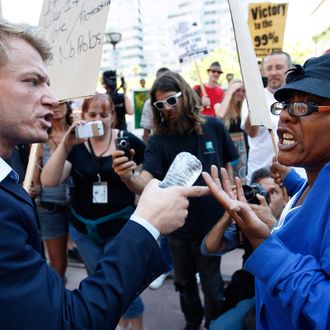
It would be really, really nice if online political discussions led to a more informed populace and to people changing their minds in light of the available evidence rather than simply doubling down on their preexisting views. Alas, a quick look at the internet, and the available research, suggests this doesn’t happen very often. But some researchers are trying to better figure out which conditions are conducive to meaningful online political debate.
One such effort was recently published in Social Media Studies by Dr. Jayeon Lee of Lehigh University and Dr. Teresa A. Meyers of George Mason University. Noting that prevailing theory suggests that exposure to and interaction with folks who have differing opinions should lead to an opinion change, the researchers decided to look at Pew Research Center data in which people self-reported their own internet habits and whether or not they had had their minds changed by online interactions.
Within the sample they examined, the researchers found 684 respondents who said they had been “exposed to a political opinion they did not agree with” on a social-networking site, or SNS. Summing up what they found when they looked for correlations between opinion change and other variables, such as how motivated they were to use social-networking sites to keep up with political events, the researchers write:
Even when a person [isn’t explicitly seeking out information of one sort or another], if the person stumbles into a cross-cutting political discussion while using SNS, he or she has a high possibility of experiencing political view change or increased issue involvement. Likewise, even without cross-cutting discussion, if an SNS user is motivated for information, he or she is likely to experience political view change or issue involvement.
Notably, information-seeking motivations was a positive predictor of cross-cutting discussion, but a negative predictor of cross-cutting exposure. This finding indicates that those who utilize SNS for political information are actually less exposed to diverse views. The most plausible psychological mechanism to explain this counter-intuitive finding may be selective exposure; it might be that those who closely follow political news via SNS tend to seek consonant information by friending or following like- minded people or news sources they prefer. This suggests the possibility of SNS functions as homogeneous “echo chambers” where diverse views are hard to find as a result of political fragmentation. However, even for these consonant information-seekers, engaging in cross-cutting political discussion has a strong deliberation effect such that they are significantly more likely to change their original views and get more involved in the issue of discussion than those who are not engaged in cross-cutting discussion.
In other words, the stereotype of people going online to argue simply for the sake of reinforcing their own views might be a bit overstated: Simply by virtue of exposing themselves to other views, some of these folks may end up being swayed a bit one way or another.
There are definitely some interesting insights here, but I’m curious about how things have changed since 2012. It certainly feels like the online environment for talking politics (and other controversial issues) has gotten far more toxic over that period. It certainly feels more likely than it was in the past that your first exposure to someone who disagrees with you about a new story will involve them screaming at your or calling you evil rather than presenting their disagreements civilly. Hopefully these dynamics aren’t preventing people from at least attempting to understand where the other side is coming from.




